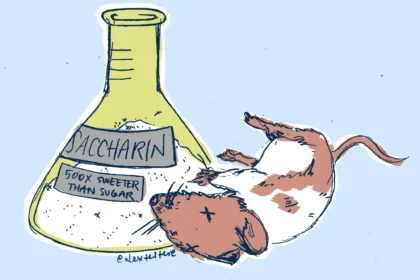In our quest for optimal health, we often turn to our refrigerators, relying on the food within to nourish our bodies. However, recent groundbreaking research has shed light on a hidden danger that may be hiding in our kitchen, potentially linked to the development of debilitating autoimmune diseases such as Type 1 diabetes, multiple sclerosis, lupus, and rheumatoid arthritis.
Interesting news from the University of Central Florida has brought to light a significant breakthrough for individuals genetically predisposed to rheumatoid arthritis. Scientists have meticulously analyzed a strain of bacteria prevalent among cows, known as Mycobacterium avium subspecies paratuberculosis or MAP, and established a compelling connection to rheumatoid arthritis.
This groundbreaking finding has prompted researchers to issue a warning to their patients, advising against the consumption of cow’s milk and beef, as these products can harbor the MAP bacteria.
The implications of this research go far beyond rheumatoid arthritis, as the identified link between MAP bacteria and autoimmune diseases raises concerns about other chronic conditions as well. As we delve deeper into the intricate relationship between our immune system and the microorganisms we encounter, it becomes increasingly apparent that our dietary choices could play a significant role in disease development.
In this article, we will explore the mounting evidence surrounding the impact of MAP bacteria on autoimmune diseases, focusing on Type 1 diabetes, multiple sclerosis, lupus, and rheumatoid arthritis. We will delve into the mechanisms through which these bacteria may trigger immune responses and discuss the precautions individuals can take to protect themselves.
It is crucial to be aware of the potential risks associated with consuming certain dairy and meat products, especially if you have a genetic predisposition to autoimmune disorders. By understanding the connection between our dietary habits and the development of these diseases, we can make informed decisions about our health and take proactive steps to safeguard our well-being.
Join us as we uncover the hidden dangers that may be residing in your fridge and explore the latest research that could revolutionize our understanding of autoimmune diseases.
What Is Rheumatoid Arthritis?
Rheumatoid arthritis (RA) is a chronic autoimmune disease that primarily affects the joints but can also impact other organs and systems in the body. Unlike osteoarthritis, which is primarily caused by wear and tear on the joints, rheumatoid arthritis is characterized by an abnormal immune response that leads to inflammation and damage in the joints.
In a healthy immune system, the body’s defenses protect against harmful substances and infections. However, in individuals with rheumatoid arthritis, the immune system mistakenly attacks the synovium, a thin membrane that lines the joints.
This immune response triggers inflammation, causing the synovium to become thickened and producing chemicals that can damage the surrounding bone, cartilage, tendons, and ligaments.
The exact cause of rheumatoid arthritis is not yet fully understood, but it is believed to involve a combination of genetic, environmental, and hormonal factors. Certain genetic markers are associated with an increased risk of developing the condition, but not everyone with these markers will develop rheumatoid arthritis.
Environmental triggers, such as infections, smoking, or exposure to certain pollutants, may also contribute to the development of the disease.
Rheumatoid arthritis can affect people of all ages, but it most commonly begins between the ages of 30 and 60. Women are more likely to be affected than men.
The disease typically progresses in a chronic and unpredictable manner, with periods of flare-ups characterized by increased joint pain, swelling, and stiffness, followed by periods of remission with milder or no symptoms.
In addition to joint symptoms, rheumatoid arthritis can cause fatigue, muscle pain, loss of appetite, and a general feeling of being unwell. Over time, the chronic inflammation can lead to joint deformities and disability, affecting a person’s ability to carry out daily activities.
While there is currently no cure for rheumatoid arthritis, advancements in treatment options have significantly improved outcomes for patients. Early diagnosis and aggressive management, including medications, physical therapy, lifestyle modifications, and in some cases, surgery, can help control symptoms, slow down joint damage, and improve quality of life.
Over 1.3 million people in the United States have rheumatoid arthritis and most of them are women. The onset of rheumatoid arthritis tends to occur between the ages of 30 and 60, especially among those with a family history of the condition.
Recommended Reading:
This Herb (named after a cat) From The Amazon Jungle Acts Like a Probiotic in Your Gut While Reducing Inflammation & Arthritis Symptoms
Infection As A Trigger
Research suggests that infections may play a role in triggering the development of the disease in individuals who are genetically predisposed. It is important to note that not all cases of rheumatoid arthritis are caused by infections, and infections alone do not directly cause RA.
However, certain infections can potentially contribute to the onset or exacerbation of the disease in susceptible individuals. Several types of infections have been studied for their potential association with rheumatoid arthritis.
For example, bacteria such as Porphyromonas gingivalis, which is linked to gum disease, and Mycoplasma pneumoniae, which causes respiratory infections, have been investigated for their role in triggering RA.
These bacteria can potentially activate the immune system and lead to an autoimmune response in susceptible individuals.
Moreover, viral infections, such as the Epstein-Barr virus (EBV) and the human parvovirus B19, have also been examined in relation to rheumatoid arthritis. These viral infections can stimulate the immune system and cause an abnormal immune response that targets the joints.
It is worth noting that while infections may act as triggers or contributors to the development of rheumatoid arthritis, they are not the sole cause of the disease. Genetic factors, hormonal imbalances, and environmental influences all interact to increase the risk of developing RA.
Further research is needed to fully understand the complex relationship between infections and rheumatoid arthritis. Identifying specific infectious triggers and understanding the mechanisms by which they interact with the immune system may pave the way for improved prevention strategies and targeted treatments for this chronic autoimmune disease.
Milk And Beef A Potential Cause?
In early 2018, Saleh Naser and his team at UCF made an important discovery: there is indeed a connection between Mycobacterium avium subspecies paratuberculosis (MAP) and rheumatoid arthritis.
Although more research is required to fully understand this relationship, common food items are now being viewed with greater caution due to their potential role in disease onset.
It is estimated that around half of the cows in the United States carry MAP, meaning that milk, beef, crops fertilized with cow manure, and other cow-related products may contain this bacteria strain. This bacteria is typically found in cows that are raised in a factory farming environment.
The best way to avoid this potential hazard is to purchase your beef and dairy from local sources, such as a farmers market or personal farmer. This not only ensures the quality of meat and dairy your getting, but also supports the local economy and is beneficial to our eco system.
Currently, there are no recommendations to completely eliminate these food items from your diet. However, future research will likely focus on detecting and removing MAP from food sources.
Dr. Shazia Bég, one of the researchers involved in the study, stated, “We don’t know the exact cause of rheumatoid arthritis, so we are excited to have found this association. However, there is still much to learn.
We need to determine why MAP is more prevalent in these patients: whether it is present because they have rheumatoid arthritis or if it actually caused rheumatoid arthritis in these individuals. Once we have that information, we can develop targeted treatments to address the MAP bacteria.”
Boost Your Gut Health, Immunity, Energy & Heal Your DNA Immediately
As we conclude this exploration into the alarming cause of rheumatoid arthritis potentially hiding in our fridges, it becomes evident that our dietary choices play a crucial role in our health. The groundbreaking research from the University of Central Florida linking Mycobacterium avium subspecies paratuberculosis (MAP) to rheumatoid arthritis has raised awareness about the potential risks associated with consuming certain food items.
While further study is needed to fully understand the relationship between MAP and rheumatoid arthritis, it is prudent to exercise caution and take preventive measures.
Opting for pasteurized dairy products, considering alternative milk options, selecting lean meats and poultry, practicing proper food handling and hygiene, and being cautious with unpasteurized products are all steps we can take to minimize potential exposure to MAP.
It is important to stay informed about the latest research and recommendations from health authorities regarding MAP and food safety. By making informed choices and following guidelines, we can strive to maintain a healthy and balanced diet while reducing the potential risk of encountering harmful bacteria.
Red Light And Near Infrared Light Therapy Is Proven To Provide Relief To RA Sufferers! Click Here To Learn More
While the link between MAP and rheumatoid arthritis sheds light on a possible connection, it is crucial to remember that rheumatoid arthritis is a complex condition with multiple contributing factors.
Genetic predisposition, environmental triggers, and other immune system factors also play significant roles. By considering the emerging research on MAP and adopting healthy lifestyle practices, we empower ourselves to make informed decisions about our well-being.
In the future, continued research efforts will likely focus on enhancing detection methods and implementing measures to remove MAP from food sources. This progress may further contribute to our understanding of autoimmune diseases and pave the way for improved prevention and treatment strategies.
By being mindful of the potential dangers that may be lurking in our fridges, we can take steps to protect ourselves and strive for a healthier, well-balanced life, reducing the potential impact of rheumatoid arthritis and other autoimmune conditions on our well-being.








